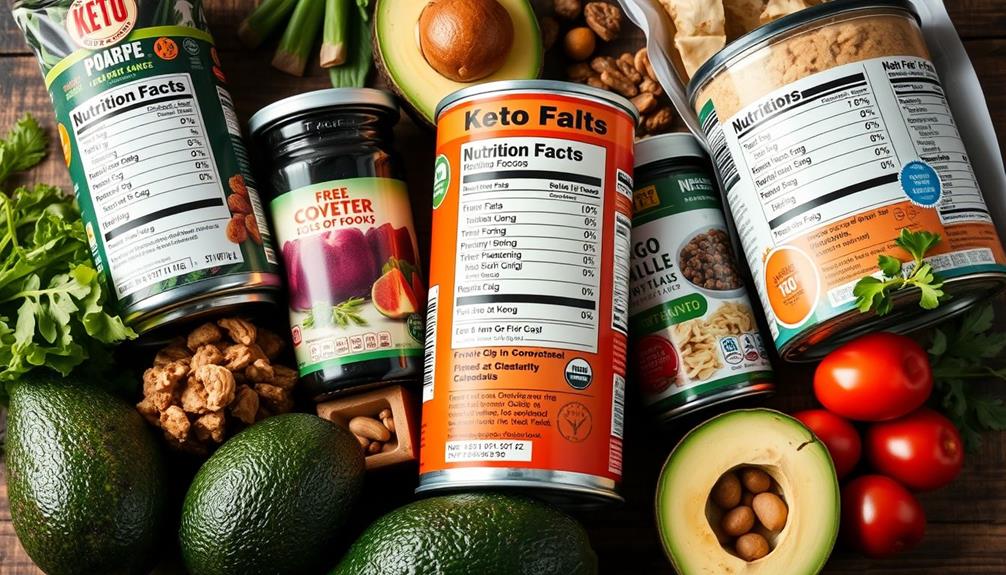When your body shifts into ketosis, it switches from burning carbs to fat for fuel. This happens when you reduce carbohydrate intake, causing your insulin levels to drop and fatty acids to be released from fat stores. These fatty acids are then converted in the liver into ketone bodies, which supply energy, especially for the brain and muscles. To find out how this process can improve your health and energy levels, keep exploring the details.
Key Takeaways
- Ketosis is a metabolic state where the body primarily uses fat-derived ketone bodies for energy instead of glucose.
- Reducing carbohydrate intake signals the body to shift from glucose metabolism to fat burning.
- Fatty acids are converted in the liver into ketone bodies through beta-oxidation during ketosis.
- Ketones serve as an alternative energy source for the brain, muscles, and other tissues.
- This metabolic shift enhances fat oxidation, supporting weight loss and improved metabolic health.

Have you ever wondered what happens in your body when you switch from burning carbs to burning fat? It all comes down to your metabolic pathways—complex processes that determine how your body generates energy. When you eat a typical diet rich in carbohydrates, your body primarily relies on glycolysis, a metabolic pathway that breaks down glucose for quick energy. But when you reduce your carb intake dramatically, your body shifts gears, activating a different set of pathways that favor fat utilization. This switch is at the heart of ketosis, a metabolic state where your body becomes a fat-burning machine.
Switching from carbs to fat relies on changing your body’s energy pathways, leading to ketosis and enhanced fat burning.
Dietary impacts play a vital role in this transition. By lowering carbs and increasing fats, you modify your nutrient intake, which signals your body to tap into fat stores instead of glucose. As carbohydrate availability diminishes, insulin levels drop, encouraging your body to release fatty acids from fat cells. These fatty acids are then transported to your liver, where they undergo beta-oxidation—a key metabolic pathway that converts them into molecules called ketone bodies. These ketones become your alternative fuel source, especially for your brain, muscles, and other tissues that typically prefer glucose. This process is a natural adaptation, allowing your body to maintain energy balance even when glucose is scarce.
The dietary impacts extend beyond just shifting fuel sources; they also influence your overall metabolic rate and hormonal balance. When you stay in ketosis, your body becomes more efficient at burning fat for energy, which can support weight loss and improve metabolic health. Additionally, the production of ketone bodies provides a steady energy supply, reducing the fluctuations often caused by carbohydrate-rich diets. This metabolic flexibility is what makes ketosis appealing for many seeking to optimize their health or manage certain conditions.
Understanding the metabolic pathways involved helps you grasp how dietary impacts can steer your body’s energy production. It’s not just about eating more fats or cutting carbs; it’s about triggering a fundamental shift in how your body processes nutrients. This shift is what transforms your metabolism from a carbohydrate-dependent system to a fat-adapted one, enabling you to burn fat more efficiently and sustainably. By consciously adjusting your diet to influence these pathways, you’re practically tuning your body’s fuel engine, allowing it to operate more effectively in the long run. Additionally, being aware of proper beneficiary designation can ensure your efforts are preserved for your future health and financial security.
Frequently Asked Questions
How Long Does It Take to Enter Ketosis Naturally?
It typically takes about 2 to 4 days for you to enter ketosis naturally when following a ketogenic diet. Your body shifts into fat metabolism mode, using stored fat for energy instead of carbs. To speed this process, you should reduce carbohydrate intake to around 20-50 grams daily, increase healthy fats, and stay hydrated. Consistency and patience are key as your body adapts to this new fuel source.
Can Ketosis Cause Nutrient Deficiencies?
About 50% of people on a strict ketogenic diet experience nutrient imbalance without proper planning. Yes, ketosis can cause nutrient deficiencies if you don’t balance your intake of vitamins and minerals. You might need supplement needs like magnesium or vitamin D to avoid deficiencies. To stay healthy, guarantee your diet includes nutrient-rich foods or consider supplements, especially if you notice symptoms like fatigue or muscle cramps.
Is Ketosis Safe for Everyone?
Ketosis can be safe for many people, but you should always seek medical supervision, especially if you have underlying health conditions. Individual differences play a big role; some may tolerate it well, while others might experience side effects. It’s important to consult your healthcare provider before starting a ketogenic diet to guarantee it’s appropriate for your unique health needs and to monitor your progress safely.
How Does Exercise Affect Ketosis?
You might notice that exercise impacts your ketosis by boosting your metabolic rate, which can accelerate fat burning. When you work out, your body uses stored fat for energy, helping you reach ketosis faster. Regular exercise not only enhances this process but also stabilizes your blood sugar levels. So, staying active supports your goals, making ketosis more effective and helping you burn fat more efficiently throughout your day.
Can You Stay in Ketosis Long-Term Safely?
Yes, you can stay in ketosis long-term safely if you focus on long-term sustainability and maintaining nutrient balance. It’s important to monitor your carbs carefully, eat a variety of nutrient-dense foods, and consult with a healthcare professional regularly. By doing so, you support your health while enjoying the benefits of ketosis, avoiding potential deficiencies or health issues that can arise from restrictive diets over time.
Conclusion
Now that you understand how ketosis turns your body into a fat-burning furnace, you hold the key to revealing sustained energy and weight loss. Think of ketosis as your body’s secret superpower, transforming stored fat into fuel when you need it most. With the right approach, you can harness this natural process and feel unstoppable. Embrace the journey, and let your body work with you, not against you, turning fat into fire that powers your best self.









